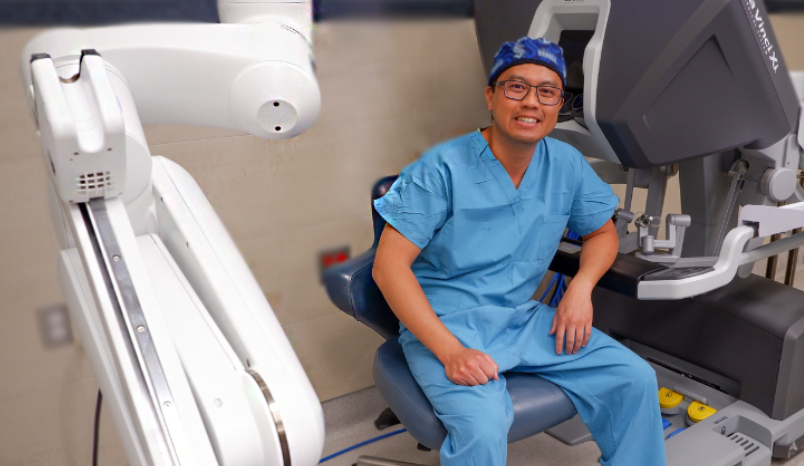Men’s Health
We provide primary care and internal medicine services focused on men’s health and wellness. Our expert team offers routine exams, health screenings and coordination of any specialty care you may need—from heart health and orthopedics to urologic and sexual health.
Feeling your best means staying healthy and active—and avoiding illness and injury as much as possible. That’s why it’s important to make your wellness a priority with specialized men’s health services at Overlake Medical Center & Clinics.
Our team includes dedicated doctors, nurses and other providers with skills and training in the health conditions and injuries that men experience. At Overlake, you’ll receive personalized care for your health needs, with a focus on wellness and preventive care. You can expect:
- An experienced and trusted team, with multiple specialties working together for seamless care.
- A collaborative, personalized approach that makes you part of the care team. We work together with you to decide on the right care and treatment.
- Evidence-based recommendations for health screenings at the appropriate times.
- Advanced technology to help you get back to your daily activities quickly.
Programs, Treatments and Services
Our team men’s health providers offers a wide range of primary care and internal medicine services. You also have access to specialty care at Overlake, based on your individual needs at every stage of your life. Our men’s health program offers:
- Cancer Care
- Diabetes and Endocrinology
- Heart and Vascular Care
- Mental and Behavioral Health
- Primary Care
- Sports & Spine Care
- Urology
Comprehensive Preventive and Primary Care
With our comprehensive primary care, you can take charge of your health and wellness through annual exams, timely screenings, vaccinations and other shots, as needed. Our preventive care services can help identify medical issues at earlier, more treatable stages—before they become serious. Together, our primary and preventive care may help lower your risk of illness and help you save on healthcare costs.
At Overlake, you can access our men’s health services at our main hospital in Bellevue and at our local network of primary care clinics. We make it easy to schedule appointments with your primary care provider, with:
- Same-day and next-day appointments often available.
- Clinics throughout the Eastside, close to where you live and work.
- Virtual visits via secure video and audio chats from the comfort of your home.
Advanced Specialty Care on the Eastside
If you need advanced care, Overlake offers a wide range of specialty care without the need to travel to Seattle. Based on your goals, your primary care provider coordinates your care with appropriate specialists for a seamless experience, tailored to your specific needs. Your primary care provider works closely with Overlake specialists in:
- Bone and joint health
- Cancer
- Digestive disorders
- Heart health
- Mental health
- Prostate and sexual wellness
You’ll find advanced services including:
- Minimally invasive surgery
- Expert cancer care
- A comprehensive medical and surgical weight loss program
- Complete care, including sleep studies, for sleep disorders
- Heart and vascular care
- Neurology care
Leading Urology Care
It’s not always easy to seek medical advice, especially for intimate concerns. That’s why we’ve created a welcoming environment where you can feel comfortable getting the care you need. At Overlake, our proactive, sensitive approach helps put you at ease, so you can focus on achieving your best health.
Our experienced urologists are doctors with additional training in diagnosing and treating conditions that affect the male urinary tract and reproductive system. We specialize in advanced diagnostic imaging, testing and treatments, including:
- BPH (enlarged prostate) management using Rezūm™ water vapor therapy, GreenLight™ Laser, transurethral resection of the prostate (TURP) and Aquablation® Therapy.
- A full spectrum of urologic reconstructive surgery, including the management of urethral stricture disease and UPJ obstruction.
- Comprehensive, multidisciplinary management of all urologic cancers in partnership with Fred Hutchinson Cancer Center. This includes prostate, kidney, bladder, ureteral and testis cancer using minimally invasive surgery, including endoscopic and robotic surgical techniques when appropriate.
- Expert and low-cost vasectomy and vasectomy reversal.
- Fertility testing and treatment and care for reproductive health needs, including infertility, erectile dysfunction and Peyronie’s disease.
- Advanced diagnostics and personalized treatment plans for pelvic pain, urinary incontinence and urinary tract infections.
- Noninvasive treatment for kidney stones.
- Testosterone replacement therapy.
Men’s Health Screening Guidelines
Take charge of your health and wellness with preventive screenings. These regularly scheduled tests can find health problems early—when they’re easier to treat. Our men’s health providers recommend that men get health screenings for:
- Colorectal cancer: Starting at age 45, men should have a colonoscopy every 10 years. Your healthcare provider may recommend earlier or more frequent colonoscopies if you have a family history of colon cancer or specific risk factors.
- Diabetes: Beginning at age 45, men should have a blood glucose (sugar) test every three years. You may need more frequent testing if you’re overweight or have a family history of diabetes.
- Excess weight or obesity: Men should have their body mass index (BMI) measured every year. BMI is a measure of body fat based on your height and weight.
- Fall risk: Starting at age 65, men should undergo a fall risk assessment. This screening includes questions and tests of balance, strength and gait (walking pattern) to determine your risk of falling.
- High blood pressure: Starting at age 20, men should have their blood pressure checked every two years, or more often, if your provider recommends it.
- High cholesterol: From age 20 through 45, men should have a blood cholesterol test every five years. Beginning at age 45, men should have this test every year. If you have certain risk factors or a family history of high cholesterol or heart disease, your provider may recommend testing more often.
- Prostate cancer: At age 50, men should talk to their provider about the potential risks and benefits of testing so they can decide whether testing is right for them. If you have certain risk factors, your provider may discuss prostate cancer screening at an earlier age.
- Vision and eye conditions: Most men should have an eye exam every two to 10 years, or every year if they have diabetes. Men with risk factors or a family history of glaucoma should have an eye exam every two years.








